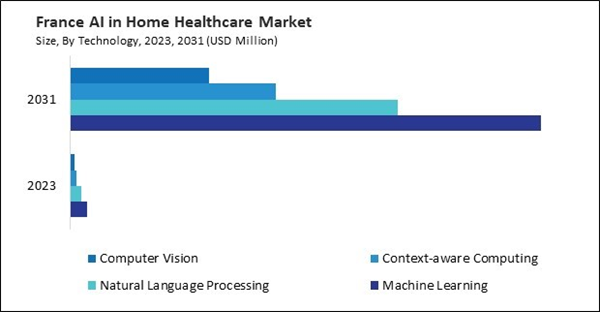The Germany market dominated the Europe AI in Home Healthcare Market by Country in 2023, and would continue to be a dominant market till 2031; thereby, achieving a market value of $2,226 million by 2031. The UK market is exhibiting a CAGR of 51.3% during (2024 - 2031). Additionally, The France market would experience a CAGR of 53.9% during (2024 - 2031).
Several factors are driving the adoption of AI in home healthcare, including the growing prevalence of chronic diseases, aging populations, healthcare workforce shortages, and the rising demand for personalized, patient-centric care. Additionally, advances in sensor technology, wearable devices, and remote monitoring solutions have facilitated real-time health data collection, providing valuable insights for AI-driven interventions and predictive analytics.
Moreover, the applications of AI in home healthcare span a wide range of use cases, encompassing remote monitoring, chronic disease management, medication adherence, personalized treatment planning, and predictive analytics. AI algorithms analyze vast amounts of patient data, including biometric readings, medical history, lifestyle factors, and environmental cues, to generate actionable insights and facilitate informed decision-making by healthcare providers.
As per the World Health Organization, committed to quality improvement and guided by the “Regional digital health action plan for the WHO European Region 2023-2030” and the “Global Strategy on Digital Health 2020-2025”, WHO/Europe is prioritizing high-quality, innovative, safe, and equitable interventions in digital health, including telemedicine. Thus, the rising adoption of digital health in Europe will drive the growth of the regional AI in home healthcare market.
Based on Offering, the market is segmented into Software (Application Programming Interface and Machine Learning Framework), Hardware and Services. Based on Technology, the market is segmented into Machine Learning, Natural Language Processing, Context-aware Computing, and Computer Vision. Based on Application, the market is segmented into Lifestyle Management & Remote Patient Monitoring, Patient Data & Risk Analysis, Virtual Assistants, Wearables, Mental Health and Others. Based on End User, the market is segmented into Healthcare Providers, Healthcare Payers, Patients, and Others. Based on countries, the market is segmented into Germany, UK, France, Russia, Spain, Italy, and Rest of Europe.
List of Key Companies Profiled
- Siemens Healthineers AG (Siemens AG)
- F.Hoffmann-La Roche Ltd.
- GE HealthCare Technologies, Inc.
- Oracle Corporation (Cerner Corporation)
- Koninklijke Philips N.V
- Merative L.P. (Francisco Partners)
- Medtronic PLC
- Sensely, Inc.
- CarePredict Inc.
- Qventus Inc.
Market Report Segmentation
By Offering- Software
- Application Programming Interface
- Machine Learning Framework
- Hardware
- Services
- Machine Learning
- Natural Language Processing
- Context-aware Computing
- Computer Vision
- Lifestyle Management & Remote Patient Monitoring
- Patient Data & Risk Analysis
- Virtual Assistants
- Wearables
- Mental Health
- Others
- Healthcare Providers
- Healthcare Payers
- Patients
- Others
- Germany
- UK
- France
- Russia
- Spain
- Italy
- Rest of Europe
Table of Contents
Companies Mentioned
- Siemens Healthineers AG (Siemens AG)
- F. Hoffmann-La Roche Ltd.
- GE HealthCare Technologies, Inc.
- Oracle Corporation (Cerner Corporation)
- Koninklijke Philips N.V
- Merative L.P. (Francisco Partners)
- Medtronic PLC
- Sensely, Inc.
- CarePredict Inc.
- Qventus Inc.









